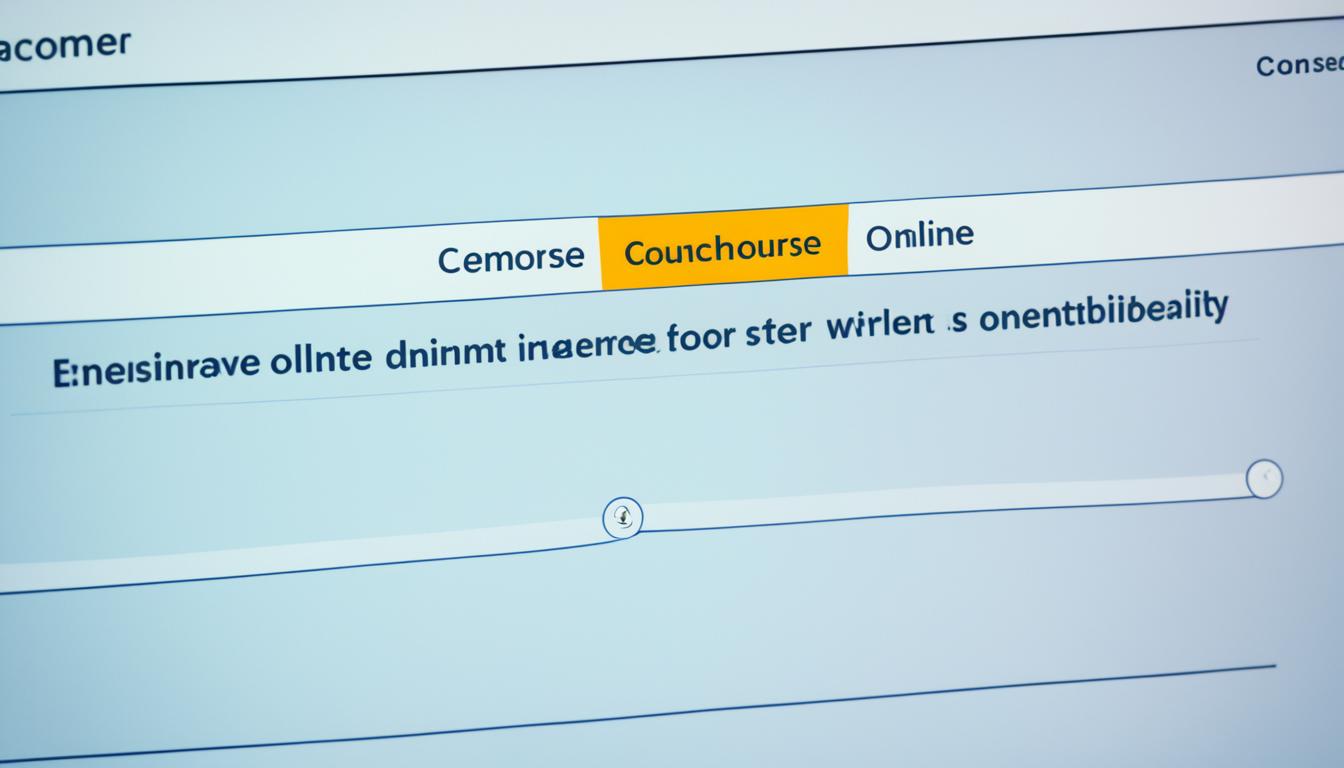Have you ever considered how many learners are left behind in the digital age due to a lack of online course accessibility? As educational institutions and course developers strive to provide inclusive education, understanding and addressing the diverse needs of all learners has never been more crucial. This article serves as a comprehensive guide to improving online course accessibility, ensuring that e-learning solutions cater to everyone, regardless of their background or ability. You’ll discover the significance of accessibility laws, practical strategies for implementation, and the numerous benefits that arise from creating a more inclusive online learning environment1.
Key Takeaways
- Online course accessibility is vital for inclusive education.
- Understanding various accessibility needs is crucial for effective e-learning solutions.
- Key legislation supports the push towards better accessibility in education.
- Strategies include using assistive technologies and designing inclusive content.
- Accessible assessment methods enhance fairness and reliability.
- Collaborating with experts can significantly improve accessibility frameworks.
- Continuous improvement based on feedback is essential for sustaining inclusivity.
The Importance of Online Course Accessibility
Online course accessibility is vital as it allows individuals with various disabilities and learning needs to fully engage with educational content. Understanding that one in six residents in the Commonwealth requires assistance underscores the importance of inclusivity2. Accessible courses foster a diverse learning environment, promoting equal opportunities for all learners.
Additionally, the benefits of accessibility extend beyond students with disabilities. They enhance the overall user experience by accommodating a wider range of learners, thus supporting online education equality. Providing accessible educational resources ensures that everyone has the chance to succeed, regardless of their abilities.
Understanding Different Accessibility Needs
Understanding diverse learning needs is crucial for creating an inclusive educational environment. Learners face a spectrum of accessibility requirements that can significantly affect their engagement and academic success. Among these needs are conditions such as visual impairments or cognitive challenges, which necessitate tailored educational practices.
For instance, providing resources like text-to-speech tools for visually impaired students helps bridge accessibility gaps and promotes individualised learning. Additionally, offering captioned video content can enhance comprehension for students with hearing impairments. Ensuring that your educational approach caters to these differences fosters a supportive learning atmosphere.
Regular assessments to identify students’ unique requirements play an essential role in shaping adaptive learning environments. Staff appointments for reviewing documentation and determining proper accommodations ensure that appropriate support systems are established for students. This process aligns with the goal of meeting a diverse range of accessibility needs while recognising the importance of ongoing adjustments as students progress.

As you develop your instructional methodology, consider the insights gained from various statistics surrounding accessibility. For example, new students register online with Student Accessibility Services (SAS), while returning students must reactivate their accommodations each term3. It underscores the necessity for clear communication regarding accessibility practices to support individualised learning trajectories.
Awareness of different conditions, such as Autism Spectrum Disorder, emphasises the importance of tailored strategies4. Additionally, the broader implications of adverse childhood experiences illustrate further challenges that students may face, affecting their learning potential5. Addressing such diverse learning needs creates an equitable educational framework for all learners.
Key Legislation Supporting Accessibility
Understanding the role of key legislation in promoting accessibility is vital for educational institutions. The Disability Discrimination Act and the Equality Act serve as crucial frameworks ensuring that students with disabilities receive equitable resources and opportunities. Under these laws, institutions are mandated to adopt significant adjustments to facilitate accessibility in all forms of education, including online courses6.
The equal education act plays an essential role in shaping curricula that are inclusive. Institutions must strive to develop online learning environments accommodating diverse learning needs, which aligns with the broader principles of disability rights7. Regular accessibility audits are fundamental in highlighting areas needing attention to maintain compliance with existing regulations6.
Key accessibility features, such as alt text for images and keyboard navigation, are necessary to ensure all users can engage fully with course content. Employing proper colour contrast and offering alternative navigation options further enhance compliance with accessibility legislation6.
Online Course Accessibility Guidelines and Standards
Several accessibility guidelines inform the creation of online courses, ensuring they meet the WCAG standards. The Web Content Accessibility Guidelines (WCAG) first published in 1999 and currently at version 2.1, provide a comprehensive framework for making online content accessible. WCAG 2.1 consists of three levels of compliance: Level A, Level AA, and Level AAA. Level A requires all content to be perceivable, operable, and understandable with alternative text for images and captions for audio8. Level AA necessitates that content is robust and compatible with assistive technologies, offering text alternatives for non-text content8. Level AAA is the highest level of accessibility, which includes features such as sign language interpreters and video descriptions8.
Familiarising yourself with these accessibility guidelines supports your efforts towards online learning compliance. Implementing features like closed captioning, audio descriptions, and adjustable font sizes are vital for enhancing the learning experience9. Accessible media incorporating alt text, closed captions, text narration, and appropriate contrast ratios enables all learners, particularly those with disabilities, to engage fully with educational materials10.
Consideration must be given to the diverse needs of learners to craft inclusive courses that offer equal opportunities for success. By adhering to established guidelines, you empower your students and help create a more equitable learning environment10.
Strategies for Enhancing Online Course Accessibility
To effectively enhance accessibility in online courses, implementing course design strategies and adaptive teaching techniques is crucial. These strategies not only improve learning experiences but also cater to diverse student needs.
Utilising Assistive Technologies
Incorporating assistive technologies can significantly benefit students with disabilities. Tools such as screen readers, magnification software, and speech recognition applications can transform the learning environment by providing tailored support. It’s imperative that you offer training sessions for students to help them maximise the use of these technologies within your online courses.
Designing Inclusive Course Content
To create inclusive course content, consider the diverse learning preferences of your students. Your course materials should be available in various formats, including text, audio, and video, which can greatly enhance accessibility. Incorporating alternative text for images and ensuring clear, logical information structuring will help reduce cognitive load, promoting better understanding. Such course design strategies enable all students to engage with the material effectively and foster a supportive learning community.
Implementing Accessible Assessment Methods
Creating accessible assessments is vital for fostering an equitable evaluation environment in online courses. You should consider offering varied assessment formats, such as portfolios, oral presentations, and traditional tests, to cater for diverse learning styles. The significance of understanding that no single method suits all learners cannot be overstated, as inclusive testing ensures that everyone has the opportunity to demonstrate their knowledge effectively.
Implementing extended time for tests or alternative formats can significantly enhance access, particularly for students with unique needs. Research indicates that the incorporation of automated assessment methods can reduce the time and effort required for grading, thereby benefiting educators and students alike. A study recently proposed a method that significantly reduces manual grading tasks, leading to efficiency in the assessment process11.
The accuracy of assessments can also improve with technology. For example, a classification accuracy of 96.97% was achieved using a designed convolutional neural network (CNN) for classifying component images11. Furthermore, high accuracy rates of up to 98.08% in generated test cases using artificial intelligence illustrate the potential of technology to facilitate inclusive testing and ensure fairness across evaluations11.
As you implement these methods, ensure that the assessment platforms are user-friendly and accessible to all students. This aids in creating a supportive educational environment conducive to success. With these strategies, you pave the way for a more inclusive assessment landscape that acknowledges and accommodates the varied needs of learners.

Benefits of Accessibility in E-Learning
Accessibility in e-learning substantially enhances student engagement and retention, making courses more effective for diverse learners. Research indicates that institutions that implement inclusive education outcomes achieve higher completion rates. When the learning needs of students are met, they are more likely to remain engaged throughout their courses, resulting in a positive educational experience.
Enhancing Student Engagement and Retention
Accessible online courses cater to various learning styles, which is essential for effective student engagement. A survey revealed that 71% of online students prefer courses with multiple content formats to accommodate different preferences12. Furthermore, 80% of learners benefit from shorter bursts of information, underscoring the significance of microlearning strategies in online education12.
Improving Learning Outcomes for All Students
Notably, incorporating elements such as closed captioning and audio narration can significantly improve learning outcomes for all students10. Accessibility measures not only support learners with disabilities but also enhance the overall flexibility of courses, benefiting up to 15% of online learners who utilize screen readers12. A structured content approach, including clear headings, can help 65% of learners who struggle with navigation in poorly organized courses12. Thus, adopting inclusive education practices leads to improved academic performance across diverse student bodies.
Collaborating with Experts in Accessibility
Engaging in expert collaboration is vital for enhancing accessibility in online education. By consulting professionals in the field, you gain valuable insights into the needs of diverse learners and the adaptations required to support them. Accessibility training for educators plays a crucial role in fostering an inclusive environment, ensuring that all students can participate fully in their learning experiences.
Utilising inclusive education resources can significantly improve course content’s effectiveness. Such resources provide educators with practical strategies to meet the needs of learners with varying abilities. Establishing partnerships with experts allows you to stay informed about the latest trends and practices in accessibility, paving the way for continuous improvement in online course offerings.

Through expert consultation, you can develop tailored programmes that address specific accessibility challenges faced by your learners. This proactive approach not only enhances student engagement but also contributes to better learning outcomes for all participants13.
Case Studies of Successful Accessible Courses
Examining accessibility case studies from various institutions reveals best practices for creating effective e-learning environments. For instance, a notable technological university in Mexico improved student participation by 15% after implementing significant accessibility enhancements. This change not only increased engagement but also fostered a better learning experience, with 78% of users reporting notable improvements in their overall educational journey14.
One compelling success story involves a university that focused on integrating assistive technologies in their online courses, which led to a 25% decrease in dropout rates among students with disabilities. These enhancements created an inclusive atmosphere where 90% of respondents found the accessible content more engaging14. By prioritising accessibility, institutions can significantly improve academic performance, evidenced by 60% of students acknowledging positive impacts on their studies14.
Such data serves as a roadmap for educators aiming to design courses that resonate with diverse student needs. Insights from students on their familiarity with AI tools are crucial. As highlighted in recent studies, positive perceptions of AI can bolster students’ motivation and commitment, shaping their educational experiences positively15.
Ultimately, these accessibility case studies pave the way for enhancing effective e-learning approaches, ensuring that all students can thrive in their academic pursuits.
Online Course Accessibility and Student Diversity
You should recognise that the diversity in education plays a critical role in shaping inclusive learning environments. A diverse student body includes individuals from various ethnic, cultural, and socio-economic backgrounds, each bringing unique perspectives and experiences to the educational landscape. By enhancing online course accessibility, you ensure that all students, regardless of their background, have equitable access to educational resources and opportunities.

For instance, Buena Vista University has about 800 full-time residential students and approximately 1,400 online students, demonstrating a commitment to creating a multicultural education experience that caters to a wide demographic16. The university encourages applications from underrepresented groups, which further enriches the educational environment and fosters inclusive learning contexts.
Moreover, the implementation of accessible online courses allows educators to address different learning styles and needs, promoting an environment where every student can thrive. For example, a first cohort of 27 faculty members at a university received certificates in inclusive teaching, illustrating a proactive approach to developing teaching methods that accommodate diverse learners17.
Ultimately, embracing diversity in education not only enhances the learning experience for students but also prepares them for a globalised world. By fostering inclusive learning environments, you contribute to the development of well-rounded individuals capable of navigating complex social dynamics.
With ongoing efforts to integrate accessibility in course design, the future of education can evolve into one that truly reflects the rich tapestry of society.
Continuous Improvement and Feedback Mechanisms
Establishing ongoing feedback mechanisms plays a pivotal role in refining accessibility practices within online courses. By actively engaging students through surveys and focus groups, you can gain deeper insights into their experiences. This ongoing dialogue fosters an environment of continuous feedback, allowing you to implement necessary changes promptly.
Programme evaluation should be an integral part of this process. Through systematic assessments, you can identify areas that require iterative improvements. Regularly reviewing course materials and teaching methods can lead to more inclusive learning experiences, ensuring that all students receive the support they need.
Moreover, leveraging technology to gather feedback can simplify the data collection process. Tools such as online forms and virtual meetings facilitate communication, helping you to understand better the effectiveness of your accessibility measures. Continuously gathering insights and implementing adjustments positions your course as a dynamic entity, responsive to the needs of its learners.
By prioritising continuous feedback and programme evaluation, you set the stage for ongoing iterative improvements that enhance the overall quality and accessibility of your courses18.
Conclusion
Accessible online courses are essential for fostering inclusive education and ensuring equal opportunities for all students. By embracing the strategies and insights detailed in this article, you can effectively implement online course improvements that cater to diverse learning needs. This proactive approach not only enhances student engagement and retention but also contributes to an overall enriched learning environment, signalling a promising accessibility future.
As you consider the transformative potential of accessibility in your course design, it becomes increasingly clear that the responsibility lies with educators to create engaging, inclusive content. The commitment to improve course accessibility should not be viewed as an optional enhancement but as a vital necessity in today’s educational landscape. Collaborating with experts and leveraging resources can significantly aid your journey towards achieving these goals19.
For further exploration into enhancing your course’s accessibility, extensive resources and expert guidance are available, such as those offered by The Continents States University. Embracing this ongoing commitment will ensure that learning remains equitable and enjoyable for every student, paving the way for a brighter and more inclusive educational future20.
Source Links
- North America Online Singing Course Market Forecast 2024 – https://www.linkedin.com/pulse/north-america-online-singing-course-market-forecast-ongec
- Center for Drug Evaluation and Research (CDER) CDERLearn Training – https://www.fda.gov/training-and-continuing-education/cderlearn
- Procedure for Requesting Accommodations – https://www.wm.edu/offices/studentsuccess/studentaccessibilityservices/students/requesting-accommodations/
- Autism Society Creating connections for the Autism community to live fully. – https://autismsociety.org/
- About Adverse Childhood Experiences – https://www.cdc.gov/aces/about/index.html
- How Can I Ensure That My Online Courses Are Compliant With Accessibility Laws? – elearningsolutions.info – https://elearningsolutions.info/how-can-i-ensure-that-my-online-courses-are-compliant-with-accessibility-laws/
- AWS Privacy – https://aws.amazon.com/privacy/
- Accessibility of Online Learning (Importance and Impact-2024) – https://kitaboo.com/importance-of-accessibility-on-online-learning-platforms/
- How to Enhance the Accessibility of your School – https://support.learnworlds.com/support/solutions/articles/12000086621-how-to-enhance-the-accessibility-of-your-school-accessibe-and-more-
- The Importance of Accessibility in E-Learning – https://www.articulate.com/blog/the-importance-of-accessibility-in-e-learning/
- An Image-Based User Interface Testing Method for Flutter Programming Learning Assistant System – https://www.mdpi.com/2078-2489/15/8/464
- How to Design an Accessible Online Course | LearnDash – https://www.learndash.com/have-you-created-an-accessible-online-course/
- 5 Best Open-Source Website Builders in 2024 (Top New Picks) – https://www.elegantthemes.com/blog/business/best-open-source-website-builders
- Desirability of Using AWS – https://link.springer.com/chapter/10.1007/978-94-6265-631-4_10
- Importance of University Students’ Perception of Adoption and Training in Artificial Intelligence Tools – https://www.mdpi.com/2075-4698/14/8/141
- Assistant Professor of Psychology – STORM LAKE, IA job with Buena Vista University | 3195368 – https://careers.insidehighered.com/job/3195368/assistant-professor-of-psychology/
- Elon launches Certificate of Inclusive Teaching program – https://www.elon.edu/u/news/2024/08/02/elon-launches-certificate-of-inclusive-teaching-program/
- Unsafe Water Advisory amended for all areas of Lahaina – https://www.mauicounty.gov/CivicAlerts.aspx?AID=14680
- Web 3.0 Explained: A Comprehensive Guide | Simplilearn – https://www.simplilearn.com/tutorials/blockchain-tutorial/what-is-web-3-0
- Frontiers | Post-COVID-19 Adaptations; the Shifts Towards Online Learning, Hybrid Course Delivery and the Implications for Biosciences Courses in the Higher Education Setting – https://www.frontiersin.org/journals/education/articles/10.3389/feduc.2021.711619/full


